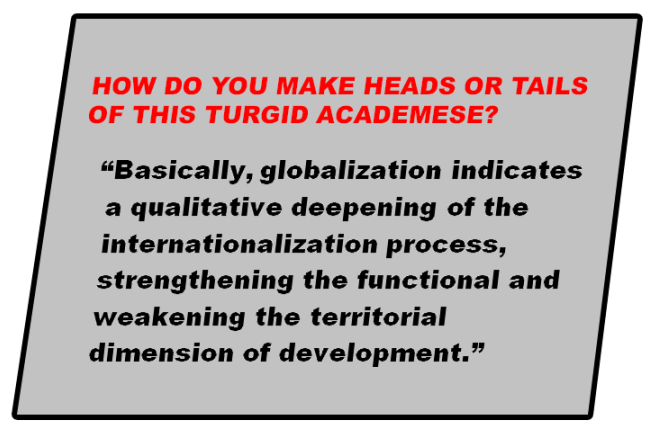Several years back, I wrote a father-and-son conversation in this column about the obtuse, imprecise English of some Philippine educators in articles that were serialized in a major national newspaper’s op-ed page. That column, “When Educators Befuddle,” quoted this particularly nebulous statement from one of the articles: “Basically, globalization indicates a qualitative deepening of the internationalization process, strengthening the functional and weakening the territorial dimension of development.”

The son, a high school junior then, found that statement “very impressive” but told his father that he couldn’t seem to understand what it was saying. The father, after quickly going over the article, said the educator probably meant to say that “Globalization is a deeper form of internationalization, one where a nation’s drive for development becomes more important than its territorial size,” or, in even simpler English, that “A nation can be small but it can become a major world economic power.”
“That certainly makes sense,” the son said, “but why do these educators say it the way they do? They’re writing not only for English experts but also for people like me, aren’t they? Why then use such fuzzy words as ‘qualitative deepening’ and ‘territorial dimension of development’?”
The father replied: “Son, this article was not written for you. It was probably done with the best intentions for their fellow educators and higher-ups, but somehow it landed on this newspaper without being adapted for readers like us.” He explained that this kind of writing appears in newspapers every now and then because some academics, impelled by the “Publish or perish” mantra, sometimes make extraordinary efforts just to get it to print. “You must publish your work no matter how trivial or badly written, or you don’t count for anything. You are dead fish,” he explained.
Over a decade since I wrote that father-and-son conversation, I called attention to it again when a rancorous debate erupted in the United States over a provocative essay, “Professors, We Need You!”, in
The New York Times by op-ed columnist Nicholas Kristof in its February 15, 2014 issue. He argued that many academics in the U.S. are beholden to a publish-or-perish tenure process and a culture that “glorifies arcane unintelligibility while disdaining impact and audience.”
Mr. Kristof observed that academics seeking tenure have a pronounced tendency to encode their insights into turgid prose. “As a double protection against public consumption,” he said, “this gobbledygook is then sometimes hidden in obscure journals — or published by university presses whose reputations for soporifics keep readers at a distance.” He then quoted a Harvard University historian, Prof. Jill Lepore, who said that the result of all this is “a great, heaping mountain of exquisite knowledge surrounded by a vast moat of dreadful prose.”
I think it would be greatly beneficial to the Philippine academic community and lay public to know those views of Kristof about academic writing and what the academic and media communities in the U.S. and abroad think about it. I therefore wrote about the furor in my online English-usage forum the week before that, giving web links to Mr. Kristof’s op-ed essay and to a representative sampling of approbations, denunciations, or rebuttals from academics and media people. To put the debate in much clearer perspective, particularly on how the usual run of academic English reads and sounds like, I also posted in full my own 2003 essay on the “publish or perish” syndrome, Philippine style.
Does that essay still represent my assessment of the kind of English that not a few Filipino academics use to formally present their ideas? Yes, I’m afraid it still does. I’ve found no reason yet to substantially change that assessment over the 16 years that I’ve been advocating plain and simple English in this column.
(Next:
We shouldn’t mistake mass nouns for collective nouns) January 17, 2019
This essay, 1,126th of the series, appeared in the column “English Plain and Simple” by Jose A. Carillo in the Campus Press section of the January 10, 2019 print edition of The Manila Times
, © 2019 by the Manila Times Publishing Corp. All rights reserved.